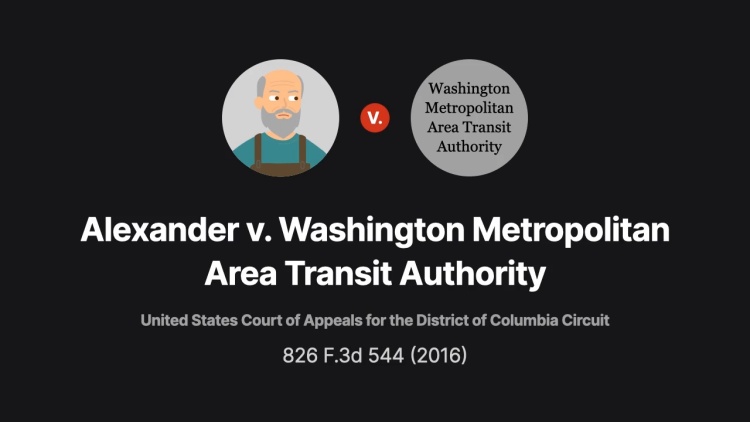Alexander v. Washington Metropolitan Area Transit Authority
United States Court of Appeals for the District of Columbia Circuit
826 F.3d 544 (2016)

- Written by Sean Carroll, JD
Facts
Carlos Alexander (plaintiff) was an employee for the Washington Metropolitan Area Transit Authority (WMATA) (defendant). Alexander was an alcoholic and was fired for being intoxicated on the job. Alexander was told he could reapply in one year after he went through an alcohol treatment program. Alexander completed the program and reapplied but was not rehired. Alexander was given a variety of reasons for why he was not rehired, including that WMATA was concerned about safety risks related to Alexander’s employment. Alexander was not drinking at the time of his applications to be rehired. Alexander brought suit under the Rehabilitation Act of 1973, claiming that he was fired and not rehired due to his alcoholism, which he claimed was a disability under the Rehabilitation Act. The Rehabilitation Act incorporated the definitions of disability under the Americans with Disability Act (ADA). Alexander stated that his alcoholism affected his sleep and daily personal care activities. The district court granted WMATA summary judgment, finding that Alexander did not have a disability because he did not establish that his alcoholism substantially limited major life activities. Alexander appealed.
Rule of Law
Issue
Holding and Reasoning (Per curiam)
What to do next…
Here's why 907,000 law students have relied on our case briefs:
- Written by law professors and practitioners, not other law students. 47,100 briefs, keyed to 996 casebooks. Top-notch customer support.
- The right amount of information, includes the facts, issues, rule of law, holding and reasoning, and any concurrences and dissents.
- Access in your classes, works on your mobile and tablet. Massive library of related video lessons and high quality multiple-choice questions.
- Easy to use, uniform format for every case brief. Written in plain English, not in legalese. Our briefs summarize and simplify; they don’t just repeat the court’s language.





